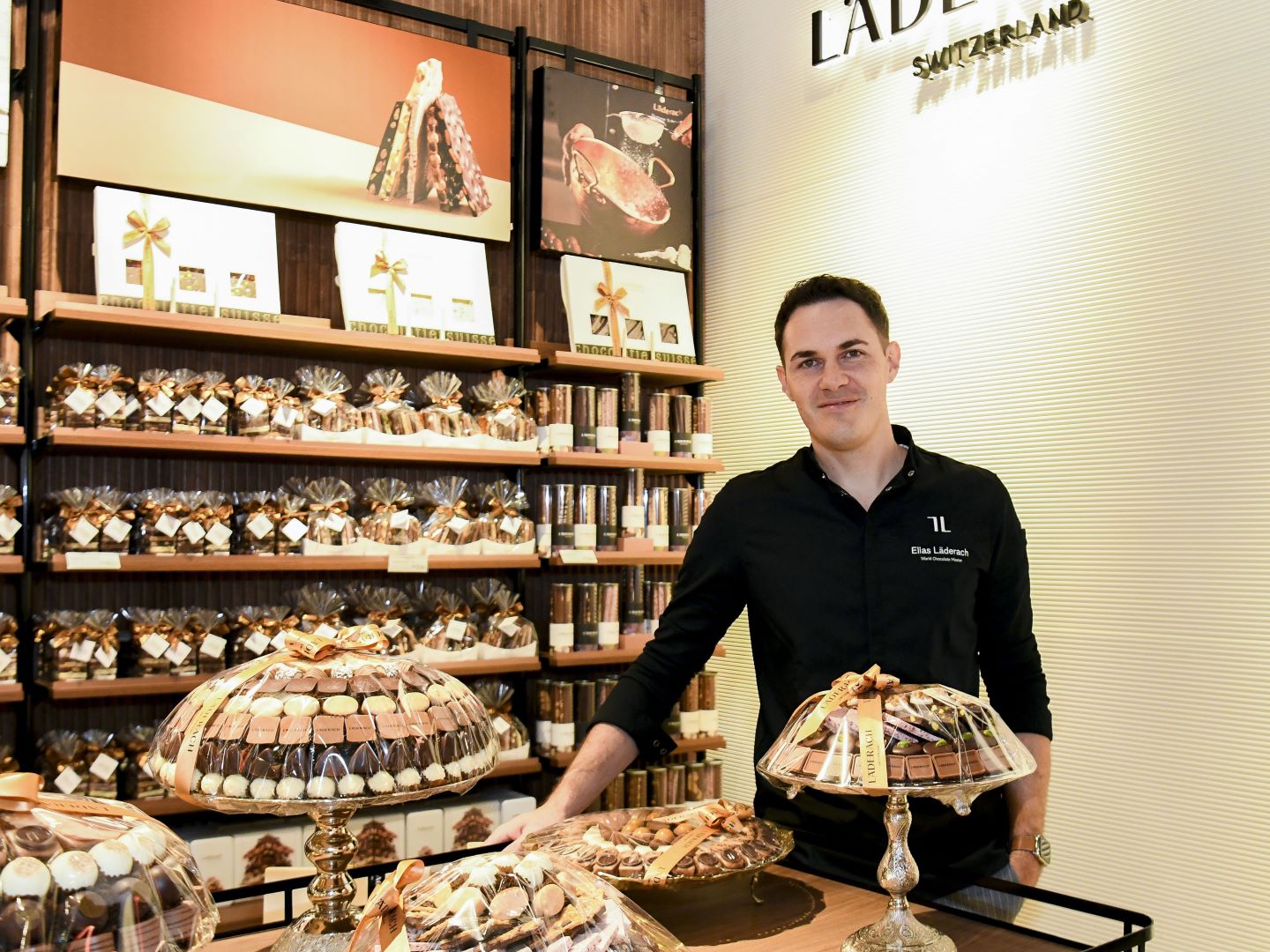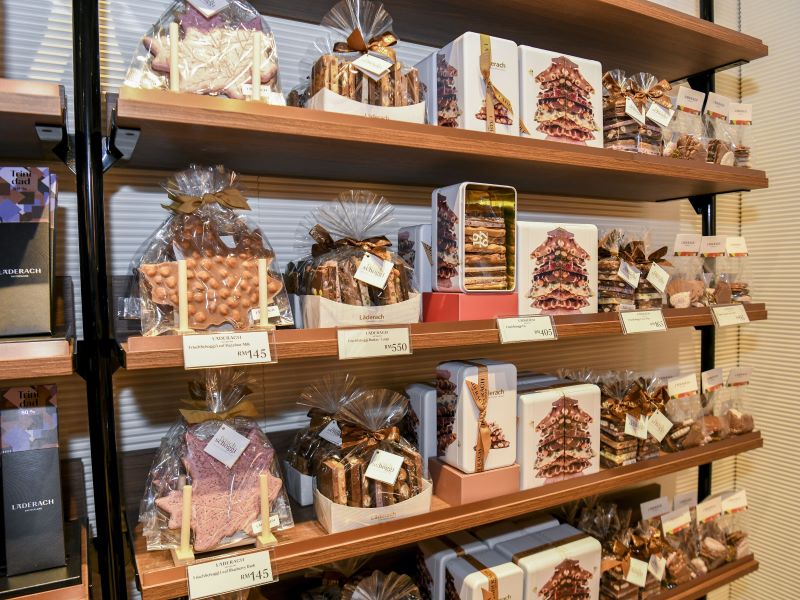
World Chocolate Master 2018 Elias Läderach proudly carries his family and country’s chocolate legacy (All photos: Shahrill Basri/The Edge)
Whether as a cheap snack, sinful indulgence or historic health drink, chocolate has a reputation that is hard-matched by any other food. TikTok feeds and Instagram recommendations remain rife with snappy reels of gargantuan, physics-defying showpieces being constructed with a smile. The words “chocolate-flavoured” seem to haphazardly precede anything nowadays, edible or not.
For how thoroughly it pervades our lives, few among us consumers can fully fathom the food of the gods in its most exalted and holistic form. But for Elias Läderach, chief creative officer of his family’s eponymous brand and the first (and only) Swiss national to win the World Chocolate Masters (WCM) in 2018, the passion for his artistic medium has been lifelong.
“What I love about being a chocolatier is the broadness of the ingredient itself. It tastes amazing, you can work with different flavour combinations, you can do so much with it, and I think that’s a big part of where my love for chocolate comes from and for what we do every day,” he says.
The third generation of the Läderach family, Elias speaks about his art with the charismatic warmth and genuine enthusiasm reserved only for those rarest and most enlightened of maestros. The 36-year-old recalls his childhood dream of becoming a wildlife ranger, but by nature or nurture, he chose to answer a sweeter calling.
“My grandfather, who founded the company [in 1962], would take us along to make Easter bunnies and bake with him, stuff like that,” he reminisces, adding that he now does the same with his children.
“There, I discovered the joy of working with chocolate — obviously I love to eat it as well. That was where it began. I think it’s also very important that my parents never pushed me into it. They just showed me the beauty of the craft and of working together in a family business, and that fascinated me. I started on that path, and here I am.”
customers_can_pick_and_choose_their_favourite_flavours_from_laderach_s_signature_frischschoggi_slabs.jpg

Those familiar with his immaculate creations will notice that flora and fauna remain significant motifs, in particular his winning designs for the WCM, which harmonised organic forms with futuristic structures.
“I take a lot of inspiration from nature itself, especially when I do showpieces, because I think it’s so beautiful. I also love to get ideas from other industries, like architecture and gastronomy.”
When working on a new creation, Elias welcomes ideas from anywhere, be it innovative accidents or team input — an inherited ethos. He explains that the company’s signature FrischSchoggi (Swiss-German for “fresh chocolate”) came from Swiss cheese counters: “[It] was actually from this concept that you can come and choose your favourite flavours and they break a piece for you.”
National heritage is incredibly important to Elias, whose homeland is credited with inventing milk chocolate and the conching process commonly utilised today.
“We use Swiss products wherever possible. The milk we put into chocolate from Switzerland just tastes different from that of other countries. I don’t know why,” he shrugs with a laugh.
True to the name of its iconic slabs, freshness is an unshakeable tenet in Läderach’s philosophy.
“Many chocolatiers, and we especially, focus on freshness. There’s a huge difference between that and the older stuff, which is why we try to produce everything from the bean to the finished chocolate in our own stores. By having the whole value chain in our own hands, you can then control all the steps, quality and freshness of the final outcome.”
This mentality expands beyond the final result, as he insists upon a “fresh” outlook to temper the brand’s rich history. “It’s important we don’t get outdated and old-fashioned. It’s a balance between taking the legacy along but also always challenging what we are doing.”
keeping_with_tradition_the_boutique_boasts_an_impressive_selection_of_pralines.jpg

The industry is not without its bitterness, however, and the artisan does not shy away from discussing the indelible realities of climate change and labour ethics.
“I think quality comes along naturally with sustainability. When we source cocoa, for example, we choose our partners very carefully. On average, we pay about 30% more to our farmers than they would get from just selling on the [global] market. We work together with associations like the Rainforest Alliance to keep a close eye on topics that are sometimes difficult or challenging, such as abusive child labour that occurs sometimes in Africa.”
The chocolate master adds that the company has made strides to provide resources for their farmers to become self-sufficient and maintain autonomy, which in turn allows them to produce consistently fine yields.
“I love to travel to the origin countries to talk with our farmers, tour our production and keep an eye on quality — my heart beats for that.”
For all the pomp and circumstance associated with luxury goods, Elias disputes any claim that high-end chocolate should elude common comprehension, asserting instead that approachability and sincerity should be at the heart of these delights.
“It shouldn’t be too snazzy or too fancy, but very honest,” he expresses with Promethean benevolence. “The products [chocolatiers] make should be very transparent and of a high standard. I believe FrischSchoggi is [an example] of this: You should have a recipe and ingredients you and your consumers understand, and that deliver on the expectation they have of premium chocolate.”
Six years on from his WCM victory, where the competition’s Futropolis theme challenged contestants to conceptualise the future of chocolate in their creations, the Swiss champion paints a vision of currently dawning trends in research and development, such as lab-grown artificial chocolate (“It doesn’t taste nice — yet”), as well as the possible impacts of global warming on cocoa-growing regions. He notes that the shift toward health consciousness now steers consumers toward more mindful eating, favouring better products.
seasonal_leaf-shaped_chocolates_commemorate_the_autumn.jpg

Looking to a more personal future, Elias hopes to share the passion he realised in his childhood with his own kids. “It’s easy, everyone loves chocolate! It’s not so difficult to give them that joy that I also got from my parents and grandparents.”
Though new releases have to be kept sub rosa, he does give a furtive hint at upcoming snackable bars and seasonal specials, in addition to the recently-released mini pralines available in Malaysian Läderach boutiques. The brand has just unveiled its third location at Suria KLCC, joining those at The Gardens Mall and The Exchange TRX.
The chocolatier’s generosity leaves a lasting impression as he urges visitors to sample the wares — which he admits may not be the most prudent business practice — attesting to a prevailing desire to share the joy he sees in his medium. The phrase “life is like a box of chocolates” seems to have exhausted its mileage, so perhaps a spin on a biblical proverb will do: “Eat thou chocolate, because it is good.”
This article first appeared on Oct 14, 2024 in The Edge Malaysia.


